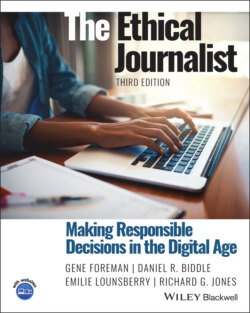Читать книгу The Ethical Journalist - Gene Foreman - Страница 44
The Hutchins Commission
ОглавлениеIronically, social responsibility in journalism was defined most persuasively not by journalists but by a panel of intellectuals. Robert Maynard Hutchins, chancellor of the University of Chicago, was asked in 1942 by Henry Luce, publisher of Time magazine, to “find out about freedom of the press and what my obligations are.” Luce put up $200,000 (about $3.3 million in 2021 currency). Hutchins assembled a panel of 10 professors, a banker who was a former professor, and the poet Archibald MacLeish. They joined him on what was formally titled the Commission on Freedom of the Press but was to become better known as the Hutchins Commission.
In 1947, the commission issued its conclusions. The report was an indictment of journalism as it was practiced in that era. As the commission saw it, the press was neglecting its social responsibility – reporting accurately on news important to society – and choosing instead to focus on sensational stories designed to attract readers rather than inform them. The report warned that if the press did not reform, it could face government intervention. 27
In the passage that was to have the most enduring influence on journalism, the commission declared that the press has the responsibility of providing “the current intelligence needed by a free society.” It then identified five things that American society needed from the press 28 :
1 A truthful, comprehensive, and intelligent account of the day’s events in a context that gives them meaning. The commission was saying that being accurate is essential but not enough. The commission then made a statement that journalists and the public recognize today as an important duty of the news media, and that is to distinguish between fact and opinion: “There is not fact without a context and no factual report which is uncolored by the opinions of the reporter.”
2 A forum for the exchange of comment and criticism. “The great agencies of mass communication,” the commission said, “should regard themselves as common carriers of public discussion.” They should publish “significant ideas contrary to their own,” using such devices as letters to the editor (or columnists offering a wide range of commentary, which would become a standard practice). The commission, which lamented that some ideas could be stifled because their authors had no access to newspaper printing presses, presumably would be gratified today by the ease with which ideas are spread on the internet.
3 The projection of a representative picture of the constituent groups in society. The commission denounced stereotypes and “hate words.” It observed that, “when the images [the media] portray fail to present the social group truly, they tend to subvert judgment.” The commission thus prodded the era’s news media, composed almost entirely of white males, to cover the entire community. The admonition was not taken seriously until the 1950s and 1960s, when the civil rights movements awakened the media to the need to broaden their news coverage.
4 The presentation and clarification of the goals and values of society. The media “must assume a responsibility like that of educators in stating and clarifying the ideals toward which the community should strive.” Sketching an agenda for the community has become a function that editorial pages and television panel discussions typically perform.
5 Full access to the day’s intelligence. The commission urged “the wide distribution of news and opinion” so that citizens could choose what they wanted to use. In the decades that followed, news outlets broadened the definition of “full access.” As surrogates for the citizens, they campaigned for legislation and court orders to compel governments to open meetings and records. They took the position that citizens should know how their business was being transacted.
The press didn’t like the Hutchins Commission’s report. Critics point to the fact that not a single journalist was on the commission. Columnist George Sokolsky said that having this commission critique the press was like having “a jury of saloonkeepers” assess the quality of education. 29 Luce himself was unimpressed, saying the report suffered from a “most appalling lack of even high school logic.” 30
Journalists also recoiled at the commission’s suggestion that citizen panels should be set up to monitor their performance. They didn’t like the idea of outsiders judging their work, and warned that voluntary commissions could lead to regulatory agencies with legal powers. It was not until 1973 that a National News Council was established to investigate complaints against the news media. It died a decade later, having failed to gain the support of either the public or the industry. 31
